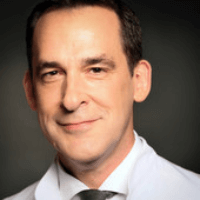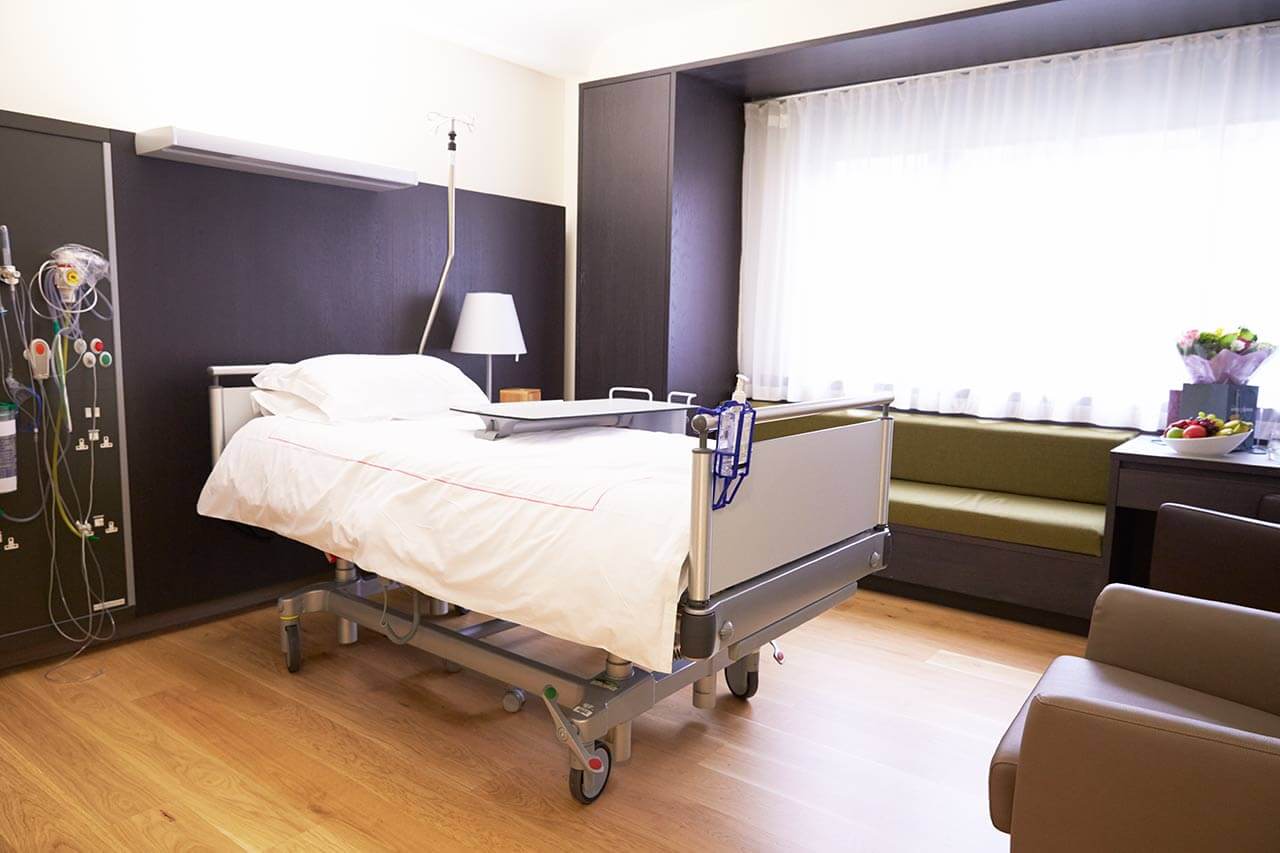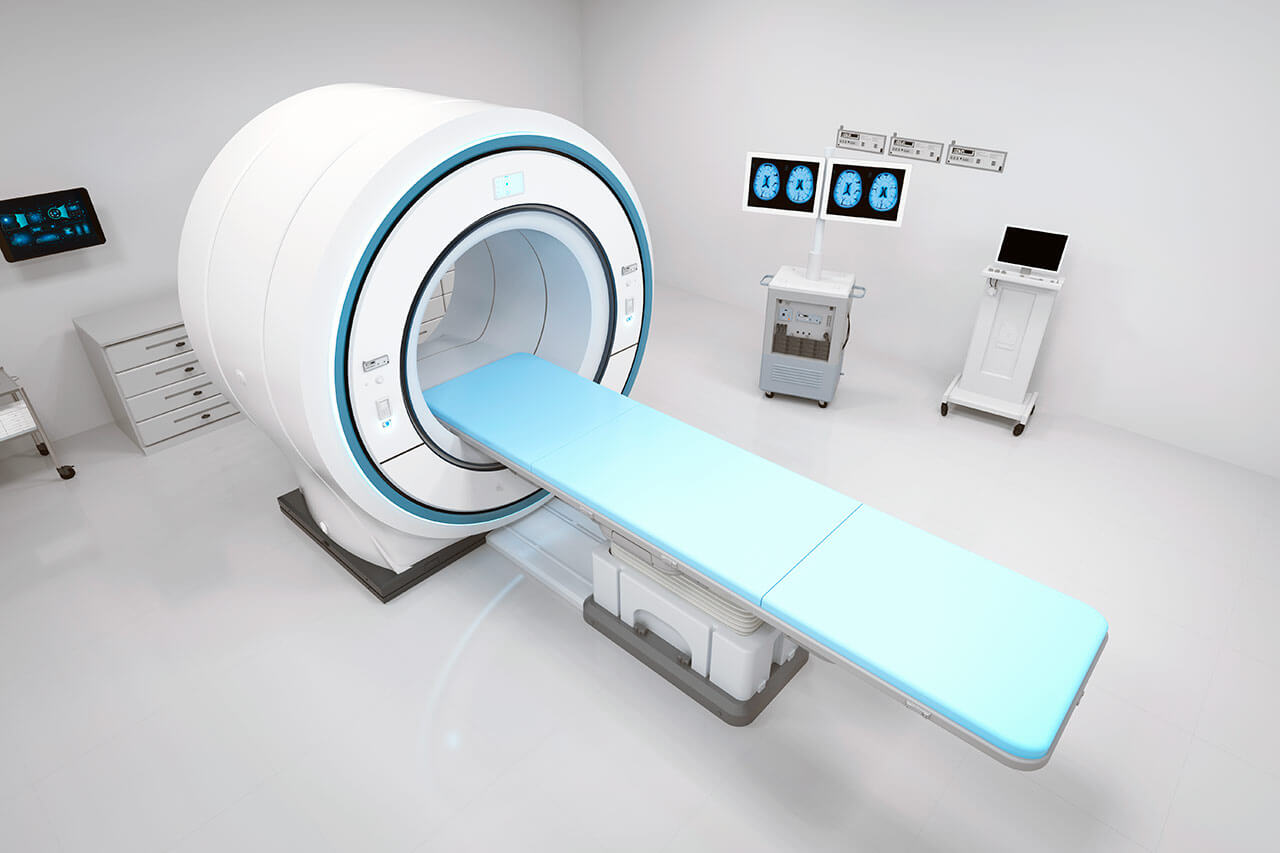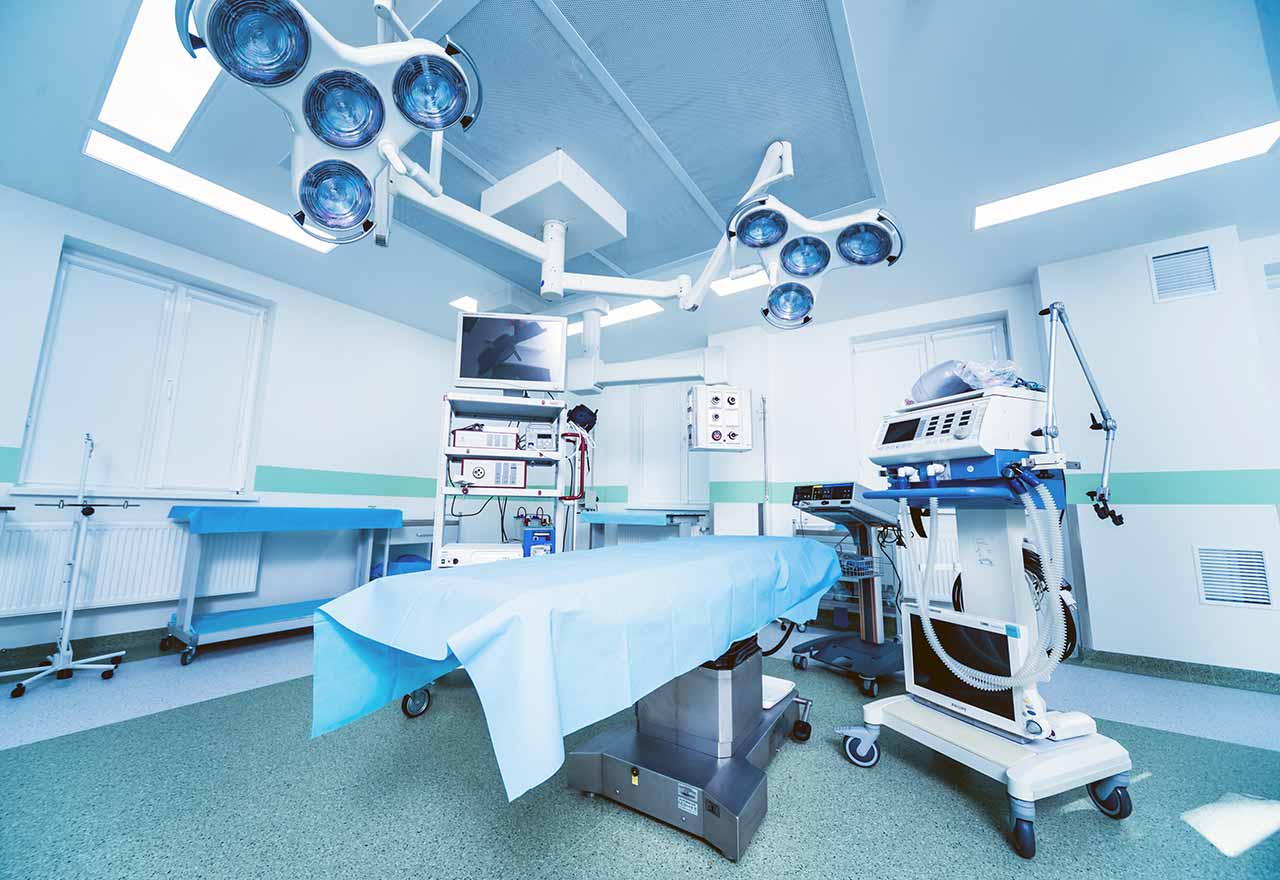
The program includes:
- Initial presentation in the clinic
- clinical history taking.
- review of medical records
- physical examination
- CT scan
- MRI scan (if indicated 1200 €)
- biopsy of tumor (if indicated 800 €)
- histological examination (if indicated 1000 €)
- nursing services
- consultation of related specialists
- consultation of the chief physician and all leading experts
- development of individual treatment plan
Required documents
- Medical records
- X-ray examination (if available)
- MRI/CT scan (not older than 3 months)
- Biopsy results (if available)
Service
You may also book:
 BookingHealth Price from:
BookingHealth Price from:
About the department
According to the prestigious Focus magazine, the Department of Adult and Pediatric Orthopedics, Trauma Surgery, Foot Surgery and Spinal Surgery at the Alfried Krupp Hospital in Essen-Steele ranks among the top German medical facilities in the areas of their specialization!
The department carries out comprehensive diagnostics and treatment of the full range of diseases and injuries of the musculoskeletal system. The department's doctors provide medical care to patients of all age groups, including young children and adolescents. The medical facility annually treats more than 5,500 patients with diseases of varying severity. The department's doctors have vast clinical experience and constantly improve their professional skills in order to be able to offer their patients the best medical service of the European level. The priority areas of the department's clinical activity include the treatment of injuries and bone fractures, joint replacement surgery, arthroscopic and septic surgery, treatment of spinal injuries and diseases. The department's doctors give preference to conservative treatment, but if a surgical procedure is still required, then endoscopic and minimally invasive techniques are mostly used. The department's operating rooms strictly observe hygiene and safety standards, while the treatment is provided in accordance with new clinical protocols.
The Head Physician of the department is Prof. Dr. med. Sven Lendemans. The specialist enjoys an excellent reputation throughout Germany, has repeatedly been included in the rating of the best specialists in the country by the Focus magazine, and also regularly demonstrates high treatment success rates.
For many years, the department's doctors have been admitting patients with various joint diseases – from arthrosis and infectious lesions to traumatic injuries and joint destruction caused by cancer. In such cases, total or partial joint replacement surgery (arthroplasty) is often the optimal treatment option. The department specializes in hip, knee, shoulder and ankle replacement surgery. The department's surgeons also successfully perform revision interventions to replace previously implanted prostheses in case of infectious lesions, displacement of endoprosthesis components, periprosthetic fracture, etc. The department's orthopedists pay due attention to counselling patients on the specifics of the upcoming surgical intervention, the best types of endoprostheses, postoperative recovery and the expected outcomes of the surgical treatment. When planning surgical treatment, the specialists carefully select the optimal type of prosthesis. Whenever required, it is also possible to implant a custom-made endoprosthesis. The surgeons of the medical facility perform joint replacement surgery using sparing minimally traumatic surgical techniques, due to which a severe pain syndrome is excluded, the period of postoperative recovery is significantly reduced and the risks to the patient's health are minimized. When performing surgical interventions, surgeons use advanced computer-assisted navigation systems, which ensure the highest accuracy of each surgical procedure and reliable placement of each element of the endoprosthesis. The success rates for joint replacement surgery in the department are quite high, for which the medical facility was awarded the EndoCert quality certificate of the German Society for Orthopedics and Orthopedic Surgery (DGOOC). This quality certificate is the most prestigious distinction in the field of endoprosthetics in Germany.
The team of orthopedists is highly qualified in arthroscopic procedures on the knee, shoulder, hip and elbow joints. Such surgical interventions are minimally invasive and, unlike arthroplasty (joint replacement surgery), allow eliminating the pathological focus, while preserving the patient's own joint. Most arthroscopic procedures are performed on the knee and shoulder joints. The spectrum of arthroscopic interventions for knee diseases includes cruciate ligament plastic repair in case of its tear, interventions for suturing and replacing menisci, cartilage cell transplantation, patella stabilization in case of its dislocation, as well as arthroscopic interventions on the knee joint for tibial fractures, patellar fracture, etc. Shoulder arthroscopic interventions are most often performed for shoulder dislocation and rotator cuff tear.
The department has the status of the certified Trauma Center (certificate of the German Society for Trauma Surgery, DGU). The medical facility has at its disposal all the technical resources required for the treatment of injuries of any severity, including the Emergency Care Unit, Intensive Care Unit, and Blood Bank. The medical institution has a helipad for urgent transportation of seriously wounded patients. Depending on the severity of the injury, conservative or surgical techniques are used. The optimal treatment regimen is determined by a highly qualified team of trauma surgeons who work in the department around the clock. The team of the department's trauma surgeons admits patients of all age categories, ranging from young children to the elderly.
An important place in the department's clinical practice is occupied by the medical care of patients with foot diseases and injuries. The most common pathologies include hallux valgus, traumatic ankle injuries, metatarsal injuries, hammer and claw toes, ingrown toenails, etc. The first-line therapy is conservative treatment, but with absolute clinical indications, doctors resort to surgery. The primary goal of therapy is to eliminate pain and quickly restore the patient's mobility.
The department's specialists also carry out conservative and surgical treatment of spinal diseases. Patients with chronic back pain often seek medical help at the medical facility. Therapeutic options for treating pain syndromes include periradicular therapy (PRT), as well as facet joint and sacroiliac joint blocks. The therapeutic procedures are performed under CT guidance, which excludes damage to the spinal anatomical structures. The above mentioned techniques are highly effective and allow the patient to avoid open surgery. The department's spinal surgeons successfully perform microsurgical interventions for spinal disc herniation, intervertebral disc replacement surgery, interventions for degenerative changes in the spine, inflammatory spinal diseases, traumatic and non-traumatic spinal deformities, interventions for spinal tumor resection, as well as stabilizing spinal operations. The department's surgeons almost always use minimally invasive techniques that exclude extensive incisions in the skin and soft tissues. Spinal surgical procedures are planned using a state-of-the-art CT scanner, while during the interventions surgeons use navigation systems.
The department specializes in the treatment of musculoskeletal diseases and injuries in children and adolescents. Of particular interest is the treatment of hip dysplasia in newborns, Perthes disease, slipped capital femoral epiphysis and spinal curvature (kyphosis, scoliosis, and Scheuermann's disease). Pediatric orthopedists achieve good results in the correction of congenital and acquired deformities: lower limb length discrepancy, O-shaped and X-shaped limb deformities, post-traumatic deformities. There is also vast experience in the treatment of musculoskeletal tumors in children: osteosarcoma, Ewing's sarcoma, bone cysts, fibrous dysplasia, etc.
The department's main clinical focuses include:
- Adult orthopedics and trauma surgery
- Partial and total knee, hip, shoulder and ankle replacement surgery
- Arthroscopic surgery
- Knee surgery
- Cruciate ligament interventions
- Joint preservation surgery: meniscal suturing, meniscal replacement, cartilage cell transplantation
- Patella stabilization
- Knee fracture treatment
- Hip surgery
- Surgery for femoroacetabular impingement
- Surgery for acetabular labral lesions
- Articular cartilage repair: microfracturing, AMIC, ACT
- Shoulder surgery
- Shoulder dislocation reduction
- Rotator cuff tear repair
- Elbow surgery
- Dislocation reduction
- Ligament plastic repair for chronic elbow instability
- Cartilage surgery: regenerative therapy, nano-fracturing, AMIC
- Removal of free articular bodies and arthrolysis
- Open and minimally invasive interventions for elbow fractures
- Knee surgery
- Septic surgery
- Interventions for acute and chronic infections of bones, soft tissues and joints
- Interventions for implant-associated infections
- Interventions for pseudoarthrosis
- Interventions for post-infectious defects
- Spinal surgery
- Microsurgical interventions on the intervertebral discs
- Intervertebral disc replacement surgery
- Surgery for spinal tumor resection
- Surgery for inflammatory spinal diseases
- Surgery for traumatic and non-traumatic spinal deformities
- Stabilization of the cervical, thoracic and lumbar spine
- Infiltration therapy
- Periradicular therapy
- Facet and sacroiliac joint blocks
- Radiofrequency denervation of the intervertebral joints
- Pediatric orthopedics and trauma surgery
- Ultrasound diagnostics for early detection of hip dysplasia with follow-up treatment
- Treatment of Perthes disease
- Treatment of slipped capital femoral epiphysis
- Treatment of inflammatory joint diseases
- Spinal curvature correction
- Kyphosis
- Scoliosis
- Scheuermann's disease
- Correction of congenital musculoskeletal deformities
- Bone growth disorders
- O-shaped and X-shaped lower limb deformities
- Foot alignment
- Clubfoot
- Flat feet
- Heel foot
- Sickled feet
- Treatment of musculoskeletal tumors in children
- Osteosarcomas
- Ewing's sarcomas
- Tumor diseases: fibrous dysplasia, bone cysts, exostoses
- Complications of tumors: local bone defects, pseudarthrosis, osteonecrosis
- Treatment of musculoskeletal injuries in children
- Foot surgery
- Ankle replacement surgery
- Ankle arthroscopy
- Hallux valgus repair surgery
- Treatment of metatarsal injuries
- Correction of hammer and claw toes
- Nail bed plastic repair
- Ankle cartilage transplantation
- Correction of complications of the peripheral nerve lesions and foot compression syndromes
- Treatment of traumatic foot injuries
- Other therapeutic options
Curriculum vitae
Prof. Dr. med. Sven Lendemans holds the position of the Head of the Department of Adult and Pediatric Orthopedics, Trauma Surgery, Foot Surgery and Spinal Surgery at the Alfried Krupp Hospital in Essen-Steele. The specialist gained his clinical experience at the University Hospitals in Essen and Giessen, which are known as one of the best medical facilities in Germany. According to the Focus magazine, Prof. Lendemans regularly ranks among the best German doctors specializing in the treatment of orthopedic diseases and musculoskeletal injuries. Dr. Sven Lendemans also has a Master's Certificate from the German Spine Society (DWG).
The doctor's clinical interests include arthroplasty, knee surgery, hip surgery, treatment of musculoskeletal injuries, including bone fractures, and sports injuries.
Photo of the doctor: (c) Alfried Krupp Krankenhaus
About hospital
The Alfried Krupp Hospital in Essen-Steele is one of the best and most advanced medical facilities in the Ruhr area. The medical complex is an academic hospital of the University of Duisburg-Essen, thanks to which it extremely quickly implements innovative diagnostic and therapeutic methods into clinical practice. The hospital is supported by the Alfried Krupp von Bohlen und Halbach Foundation. The doors of the medical complex were first opened for patients back in 1870, and in 1980 the hospital building was completely renovated and upgraded with modern equipment. The hospital has seven specialized departments, each of which has a competent team of highly qualified doctors specializing in the treatment of a particular group of diseases. The patients of the hospital receive inpatient and outpatient medical care. The hospital has 320 beds for patient hospitalization.
The priority areas of work of the medical facility include general and abdominal surgery, plastic, aesthetic and reconstructive surgery, hand surgery, treatment of ENT diseases, musculoskeletal injuries and diseases, gastrointestinal and respiratory diseases, as well as treatment of urologic diseases. The doctors working at the hospital have excellent qualifications in laparoscopic, endoscopic and da Vinci robot-assisted surgery. Therefore, if surgical treatment is required, open traumatic operations are performed very rarely – only in especially complex clinical cases. The use of modern surgical techniques avoids extensive skin and soft tissue incisions, reduces surgical risks and the recovery period.
The medical team of the hospital consists of leading German doctors with profound clinical training and successful experience. Doctors admit patients with diseases of varying severity, including serious pathological conditions, and therefore the patients' credit of trust in specialists is very high. Particular attention is paid to an individual approach to each patient and his clinical case. In addition, doctors take care of the comfort of their patients during the therapeutic process – the patient with his needs and wishes is always a top priority.
Photo: (с) depositphotos
Accommodation in hospital
Patients rooms
The patients of the Alfried Krupp Hospital in Essen-Steele live in single comfortable rooms with all amenities. Each patient room has an ensuite bathroom with shower and toilet. The furnishing of the patient room includes an automatically adjustable bed, a bedside table, a table and chairs, a wardrobe, a telephone and a TV. The rooms also have Wi-Fi.
The hospital offers enhanced-comfort rooms. Unlike standard rooms, such patient rooms additionally include upholstered furniture, a safe, a mini fridge and an air conditioner. The bathroom has towels, a bathrobe, toiletries and a hairdryer. Fresh newspapers, seasonal fruits, coffee and tea are brought to the patient room every day upon the request.
Meals and Menus
The patients of the hospital are offered three meals a day. Breakfast and dinner are served buffet style, while for lunch patients are offered a choice of several set menus. Patients staying in the enhanced-comfort rooms are offered a special menu with a wide range of delicious European dishes.
If for some reason you do not eat all the foods, you will be offered an individual menu. Please inform the medical staff about your dietary preferences prior to the treatment.
Further details
Standard rooms include:
Religion
The services of representatives of religions are available upon request.
Accompanying person
During an inpatient program, an accompanying person can stay with you in the patient room or in a hotel of your choice.
Hotel
During an outpatient program, you can stay in a hotel of your choice. The managers will help you choose the most suitable options.




